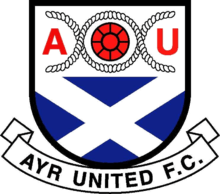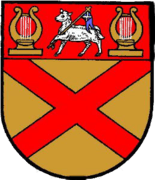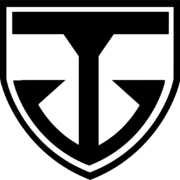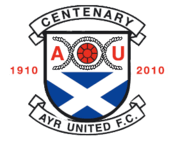Ayr United F.C.
 | |||
| Full name | Ayr United Football Club | ||
|---|---|---|---|
| Nickname(s) | The Honest Men[1] | ||
| Founded | 1910 | ||
| Ground | Somerset Park | ||
| Capacity | 10,185[2] (1,597 seated) | ||
| Chairman | Lachlan Cameron | ||
| Manager | Ian McCall | ||
| League | Scottish Championship | ||
| 2015–16 | Scottish League One, 2nd (promoted via play-offs) | ||
| Website | Club home page | ||
|
| |||
Ayr United Football Club are a Scottish association football club based in Ayr that plays in the Scottish Championship, the second tier of the Scottish Professional Football League. Formed in 1910 after the merger of former clubs Ayr Parkhouse and Ayr (the latter being a prior merger of Ayr Thistle and Ayr Academicals in 1879), their nickname is The Honest Men, taken from a line in the poem "Tam o' Shanter" by Scotland's national poet, Robert Burns. They play at Somerset Park.[3]
The club have spent 34 seasons in Scotland's top division altogether, though the last was in the 1977–78 season. The club have been the champions of the second tier of Scottish football on six occasions and of the third tier twice, but have not won any national cup competitions. The club's most famous and most successful manager is Ally MacLeod, who went on to manage the Scottish national football team. In May 2016 United secured promotion to the Scottish Championship via the Playoffs.
History
Ayr United were founded in 1910 after the merger of Ayr Parkhouse and Ayr. Although Inverness Caledonian Thistle are also the product of a merger between two clubs, Ayr United are the only Scottish Football League club to have been formed from a merger of two existing league clubs.
The club's honours include winning six Second Division titles (as the second tier championship) and a further two such titles (as the third tier championship), most recently in 1996–97. They have not won any national cup competitions, although they were runners-up in the 2001–02 Scottish League Cup, and in the Scottish Challenge Cup in the first two seasons in which the competition was held: 1990–91 and 1991–92. They have won the local competition the Ayrshire Cup on 26 occasions, most commonly facing fierce local rivals Kilmarnock in the final. The Ayrshire Cup was last played for in season 1996–97, since when the competition has been suspended.
The club's record scorer in a single season is Jimmy Smith, who scored 66 goals for Ayr in only 38 league matches in 1927–28 and currently holds the British goalscoring record for the most league goals scored in a single season.[4] The club's overall record scorer is Peter Price, who scored 213 times in competitive matches for the club between 1955 and 1962.
Former Scottish national team manager Ally MacLeod is regarded as the club's most famous and most successful manager. He led the club on three separate occasions spanning 15 years, during which his teams recorded a record 214 wins, and won two league titles. In 1973 MacLeod was voted Ayr's Citizen of the Year. More recent managers have also included the recent Scottish national team manager, George Burley, and former Scottish League Cup winner with Raith Rovers, Gordon Dalziel. Their current manager is Ian McCall.
Although the club has spent 34 seasons in Scotland's top division, they have played in the second and third tiers of Scottish senior football since the 1977–78 season. During the late 1990s and early 2000s, the club established a record of defeating teams which played in higher leagues in cup competitions, including Hibernian, Dundee, Dundee United, Motherwell, Dunfermline Athletic and four consecutive wins in cup competitions against their fiercest rivals Kilmarnock.
In 1988, Ayr United fan and businessman Sir David Murray offered to buy the club but the club's shareholders rejected the bid by a vote of 60 to 56. The manager at that time, Ally MacLeod, had threatened to leave if Murray's bid had succeeded: Murray went on to become Chairman of Rangers, which coincided with a period of financial growth and league success for that club. During much of the 1990s and 2000s, a period of relative success both in league and cup competitions, the Ayr United chairman was local construction magnate Bill Barr. After Barr stood down, there were occasional boardroom struggles: the club suffered significant cashflow problems in 2004 although it survived with a combination of efforts. Prestwick-based Roy Kennedy failed to takeover the club in 2005, and his company Kennedy Construction went bankrupt in 2006.
On 24 May 2009, Ayr won the Scottish First Division Play-off against Airdrie United 3–2 on aggregate to win promotion to the First Division. The following season, to celebrate the club's centenary, Ayr United played in black and white hoops, the club's original black and white kit. The away kit was crimson and gold with blue shorts to reflect the original club colours. But it was not a successful season. Ayr were relegated on the last day of the season after losing 2–1 to Morton. The club bounced back the following season, winning promotion after defeating Forfar Athletic and Brechin City in the play-offs. That same season, they knocked out Hibernian in the Scottish Cup, winning 1–0 at Somerset Park in a replay.
In the 2011–12 season, Ayr enjoyed success in the 2011–12 Scottish League Cup, beating SPL sides Inverness, Hearts and St Mirren on their way to the semi-finals. Ayr United played Ayrshire derby rivals Kilmarnock in the semi-finals, the first time the two clubs had met at this stage. Kilmarnock won one-nil. But the league campaign was less successful, United were relegated to the Second Division following play-off defeat to Airdrie United.[5]
Following relegation, United announced that Brian Reid's contract would not be renewed. The club appointed Mark Roberts, top scorer in the previous three seasons, manager, with head of youth development, Davie White, as his assistant.[6] In January 2015, Ian McCall was appointed Ayr's new manager, taking over from Roberts. After saving the club from relegation on the final day of the 2014–15 season, McCall led Ayr back to the Championship with a penalty shoot-out victory over Stranraer in the Playoffs.[7]
Crest and colours
Crests
Since 1948, Ayr United have used a crest which is a shield containing a Scottish saltire, with a scroll beneath stating the club's name.[8] In 2015, the club became subject to a legal action which claimed that the crest was an unregistered coat of arms.[8] After it had emerged that the clubs badge was in jeopardy, a petition was started by fans and gained 700 signatures in 24 hours.[9] The campaign gained support and many political, footballing figures and fans alike have lent support to keep the Ayr badge intact. Leader of the Scottish Conservative Party leader Ruth Davidson, who stated "If archaic rules are forcing the team to change the badge, then I think we need to look at those rules again. When John Scott brought this issue to my attention, I was happy to take it all the way to the UK Government."[10] Another prominent name to join the campaign was former Ayr United and Bayern Munich striker and now a Sky Sports pundit on Soccer Saturday, Alan McInally, who said "Badges are so important to football supporters and are treasured by everyone. They are worn with pride by grandfathers, dads and sons as they represent the club that they support. New stadiums get built and re-named but the club badge always stays the same”.[11]
-
 The crest of Ayrshire between 1890 and 1931, similar to the Ayr United crest.
The crest of Ayrshire between 1890 and 1931, similar to the Ayr United crest. -
 The crest worn between 1938 and 1948.
The crest worn between 1938 and 1948. -
 The Centenary logo used on the Playing kit between 2009 and 2011.
The Centenary logo used on the Playing kit between 2009 and 2011.
Colours
The club's original jerseys were red and gold, inherited from Ayr,[12] with navy blue shorts and socks. In 1914, Ayr adopted black and white hoops, which were worn, with several modifications, up to 1930, when The Honest Men switched to a plain white jersey, with navy blue shorts and socks, worn until the outbreak of World War II. After the war, the club retained the white jersey, and switched back to the black shorts that had originally complimented the hooped shirts, kits similar to these were worn up to 1958, when Ayr had changed the black and white look for a white with a blue trim, used until 1963, when they once again reverted to the black and white hoops, that were kept until 1968 and not used again until the 2009–10 centenary season. From then until 1994, Ayr maintained white jerseys trimmed with black with either black or white shorts and socks, then switching to a striped shirt for a single season. The following season, Ayr wore an all-black jersey for the first and only time. Ayr went back to keeping an all-white jersey with either white or black shorts and socks until the centenary season. For the 2011–12 season, a half-black-half-white shirt for the first time, however, Ayr FC had previously wore a similar jersey between 1899 and 1903. The 2013–14 season saw Ayr return to the white jersey, black shorts and socks for the first time since 1973.
Home Kits
Away Kits
Sponsorship
| Period | Sportswear | Home sponsor | Away sponsor | |||
|---|---|---|---|---|---|---|
| 1977–1981 | Umbro | None | ||||
| 1981–1987 | Barr Construction | |||||
| 1987–1988 | Ayr Advertiser | |||||
| 1988–1990 | Bukta | Centrum | ||||
| 1990–1991 | Riberio | |||||
| 1991–1993 | Arrow | |||||
| 1993–1994 | Sports Limited | |||||
| 1994–1995 | Core | What everyone Wants | ||||
| 1995–1996 | The Ayr United Collection | |||||
| 1996–1997 | Ayrshire Post | |||||
| 1997–1998 | Premier Marketing UK | |||||
| 1998–1999 | Barr Construction | |||||
| 1999–2000 | TFG Sports | Strachans Motors | Barr Construction | |||
| 2000–2001 | Leader Newspaper | Barr Steel | ||||
| 2001–2002 | Aurigin | |||||
| 2002–2004 | Kerr & Smith | Iveco Daily | ||||
| 2004–2005 | Kennedy Construction | Simply Purchasing | ||||
| 2005–2006 | The Home Bakery | Honest Men Trust | ||||
| 2006–2007 | The Events Company | Greig Lucas | ||||
| 2007–2008 | Lotto Sports | Rodie | Carrick Bathrooms | |||
| 2008–2010 | Surridge Sports | Paligap | ||||
| 2010–2011 | Nike | |||||
| 2011–2014 | Bodog | |||||
| 2014–2017 | Adidas | |||||
Stadium
Ayr play their football at Somerset Park in Ayr's New Town. One of the few surviving traditional stadium designs, it consists of one stand, two covered terraces, and one open terrace. It has a capacity of 10,185.[2] The first match to take place at Somerset Park was between the former Ayr and Aston Villa in a 3–0 victory for Ayr.
During the 1990s the club's chairman was Bill Barr, who owned and managed the company which built modern-style stadiums and stands for several other clubs around the UK. United also sought — and obtained — planning permission from South Ayrshire Council for a new 10,200 all-seated stadium at Heathfield in Ayr with an associated retail development. The Scottish Executive then "called in" the application and reversed the decision in respect of the retail development. Since the club considered this aspect of the proposal necessary to fund the construction, the development did not proceed.[13]
In November 2006, United signed a contract with Barratt Homes for the sale of Somerset Park, having secured a 20-acre (81,000 m2) site in the Heathfield area of Ayr. The site would house a new GB£18 million stadium seating 7,650 as part of a "sports and business campus".[14] The project ultimately did not proceed.
Players
First-team squad
- As of 13 November 2016
Note: Flags indicate national team as defined under FIFA eligibility rules. Players may hold more than one non-FIFA nationality.
|
|
Coaching staff
| Role | Name |
|---|---|
| Manager | Ian McCall |
| Assistant Manager | Neil Scally |
| Head of Youth Development | David White |
| Goalkeeping Coach | Robert Glen |
| Physiotherapist | Steven Maguire |
| Kitman | Graham Steel |
Managers
| Dates[15] | Name | Notes |
|---|---|---|
| 1910–1914 | Committee | |
| 1914–1915 | |
Ayr United's first manager |
| 1915–1918 | |
|
| 1918–1919 | |
|
| 1919–1923 | |
|
| 1923–1924 | |
|
| 1924–1926 | ||
| 1926–1931 | ||
| 1931–1935 | ||
| 1935–1940 | ||
| 1945–1948 | |
|
| 1949–1953 | ||
| 1953–1955 | ||
| 1955–1956 | ||
| 1956–1961 | ||
| 1961 | ||
| 1961–1962 | ||
| 1962–1963 | ||
| 1963–1964 | ||
| 1964–1966 | ||
| 1966–1975 | ||
| 1975–1978 | ||
| 1978 | ||
| 1979–1983 | ||
| 1983–1985 | ||
| 1985–1990 | ||
| 1991–1993 | ||
| 1993–1995 | ||
| 1995–2002 | ||
| 2002–2004 | ||
| 2004–2005 | ||
| 2005–2007 | ||
| 2007 | ||
| 2007–2012 | ||
| 2012–2014 | ||
| 2015– |
Honours
Domestic
League
- Scottish Second Tier Division Two, Division B, Division One, Championship
- Scottish Third Tier Division Two, League One
Cups
Regional
- Ayrshire Cup
- Winners (26): 1911–12, 1925–26, 1928–29, 1932–33, 1935–36, 1937–38, 1938–39, 1949–50, 1957–58, 1958–59, 1960–61, 1964–65, 1968–69, 1969–70, 1970–71, 1974–75, 1975–76, 1976–77, 1977–78, 1979–80, 1985–86, 1987–88, 1988–89, 1990–91, 1994–95, 1996–97
- Ayr Charity Cup
- Winners (17): 1911–12, 1912–13, 1913–14, 1914–15, 1915–16, 1918–19, 1920–21, 1923–24, 1925–26, 1926–27, 1928–29, 1929–30, 1930–31, 1931–32, 1935–36, 1937–38, 1951–52
- Kilmarnock Charity Cup
- Winners (4): 1930–31, 1932–33, 1935–36, 1936–37
Records
Club
25,225 vs Rangers, 13 September 1969 in Scottish League Division One[16]
51,158 vs Rangers, 4 April 1973, Scottish Cup semi-final, at Hampden Park[16]
106 vs Girvan, 1 May 1991 in the Ayrshire Cup[16]
192 vs Deveronvale, 28 November 2009, in the Scottish Cup[16]
11–1 vs Dumbarton, 13 August 1952[16]
0–9 vs Rangers, 16 November 1929[16] |
John Murphy (597 apps), between 1963–1978[16]
Peter Price, (213 goals in 251 apps) between 1955–1962[16]
Jimmy Smith, (66 goals in 38 apps) in the 1927–28 Season[16]
James Nisbet for Scotland (3) vs Norway, Germany and The Netherlands in 1929.[16]
Mark Shankland, aged 15 years and 300 days (vs Brechin City, 7 May 2011).[17]
Alan Forrest, aged 16 years and 321 days (vs Queens Park, 27 July 2013). |
Individual
All players are from Scotland unless otherwise stated.
|
|
Hall of Fame
| Year Inducted | Name | Years at Ayr Utd. | Role(s) at Ayr Utd. |
|---|---|---|---|
| Ally MacLeod[18] | 1964–1965, 1966–1975*, 1978*, 1986–1989* | Player and Manager | |
| Ian McAllister[18] | 1977–1992 | Player | |
| Peter Price[18] | 1955–1962 | Player | |
| Sam McMillan[18] | 1952–1968 | Player | |
| John 'Spud' Murphy[18] | 1963–1978 | Player | |
| Henry Templeton[18] | 1987–1991 | Player | |
| Alex 'Dixie' Ingram[18] | 1966–1970, 1970–1977, 2008–[19]** | Player and vice-chairman | |
| Alex 'Sanny' McAnespie[18] | 1964–1978 | Player | |
| Davie Stewart[18] | 1967–1974 | Player | |
| Rikki Fleming[18] | 1968–1978 | Player | |
| Dick Malone[18] | 1964–1971 | Player | |
| |
The 1987–88 Squad | 1987–88 | Team |
* years involved as a manager
** years involved as vice-chairman
| Year Inducted | Player | Years at Ayr United |
|---|---|---|
| |
Sir Alex Ferguson CBE | |
| |
Steve Archibald | |
| |
Alan Rough | |
| |
Ally MacLeod | 1966–1975* |
* years involved as manager
| year Inducted | Player | Years at Ayr United |
|---|---|---|
| |
Sir Alex Ferguson CBE | |
International players
Only includes caps won while playing for Ayr United.
|
|
References
- ↑ "Ayr United FC". Retrieved 25 August 2011.
- 1 2 "Ayr United Football Club". Scottish Professional Football League. Retrieved 11 November 2013.
- ↑ "Club History".
- ↑ "Club Honours – Ayr United Football Club". www.ayrunitedfc.co.uk. Retrieved 2016-05-30.
- ↑ "Ayr United 1–3 Airdrie United". Retrieved 15 May 2012.
- 1 2 "Change in Manager". Ayr United F.C. 15 May 2012. Retrieved 15 May 2012.
- ↑ "Ayr United 0-0 Stranraer (agg 1-1, 3-1 pens)". 15 May 2016 – via www.bbc.co.uk.
- 1 2 Mair, Findlay (19 November 2015). "Ayr United face legal action over team badge". The Scotsman. Retrieved 20 November 2015.
- ↑ "Ayr United badge: Almost 700 signatures raised in 24 hours after The Ayrshire Post launch petition to save historic crest". Daily Record. 26 November 2015. Retrieved 22 December 2015.
- ↑ "Save The Badge: Scots Tory leader Ruth Davidson pledges to "defend the proud history" of Ayr United". Daily Record. 26 November 2015. Retrieved 22 December 2015.
- ↑ "Sky Sports pundit Alan McInally supports Ayr United's bid to save the badge" of Ayr United". Daily Record. 19 December 2015. Retrieved 22 December 2015.
- ↑ "Ayr FC kit history". HistoricalKits.co.uk. Retrieved 2011-02-12.
- ↑ "Ayr United Football Club — Official Website". Ayrunitedfc.co.uk. Retrieved 2009-04-17.
- ↑ "Ayr poised to sell Somerset Park". BBC Sport. 28 November 2006. Retrieved 2009-04-17.
- ↑ "Archived copy". Archived from the original on 7 December 2009. Retrieved 2009-04-12.
- 1 2 3 4 5 6 7 8 9 10 11 12 13 14 15 16 17 18 19 20 21 22 23 24 25 Carmichael, Duncan. Walking Down the Somerset Road. Fort Publishing Ltd ISBN 1-905769-05-9.
- ↑ "Youngest Ever Player to play for Ayr United". ayrunitedfc.co.uk/. Ayr United F.C. 10 May 2011. Retrieved 1 August 2012.
- 1 2 3 4 5 6 7 8 9 10 11 "Hall of Fame". Ayr United F.C. Retrieved 22 June 2012.
- ↑ "BREAKING NEWS: Ayr United chairman resigns". Troon Times. 12/03/2008. Retrieved 22 June 2012. Check date values in:
|date=(help) - ↑ "2004 inductees". Scottish Football Museum. Retrieved 22 June 2012.
- ↑ "Steve Archibald". Scottish Football Museum. Retrieved 25 April 2016.
- ↑ "2002". National Football Museum. Retrieved 22 June 2012.
- ↑ "Føroyar – Estland 0 – 2". www.faroesoccer.com. Retrieved 27 September 2016.
- ↑ "Føroyar – Litava 0 – 1". www.faroesoccer.com. Retrieved 27 September 2016.
- 1 2 "Kekkia – Føroyar 2 – 0". www.faroesoccer.com. Retrieved 27 September 2016.
- 1 2 "Finnland – Føroyar 1 – 0". www.faroesoccer.com. Retrieved 27 September 2016.
- 1 2 "Ísland – Føroyar 3 – 2". www.faroesoccer.com. Retrieved 27 September 2016.
External links
- Official website
- Map and aerial photos
- Unofficial Ayr United fans forum
- Ayr United History
- The Honest Men Trust
- Complete pictorial history of Ayr United playing kit at Historical Football Kits